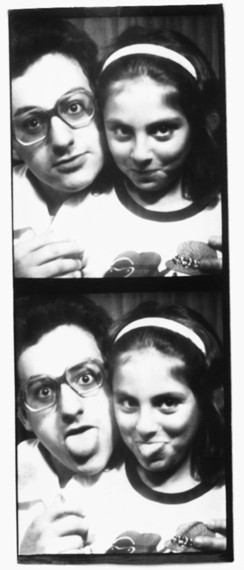
I grew up in Siberia where my dad was a political journalist. He was against everything that was going on in the country politically and tried his best to tell controversial stories on TV. I'm sure this was an impossible task. He taught me to question everything around me and to take nothing at face value.
My mom was a non-political, non conformist by nature. This was best expressed by the fact that, if she wanted something, there was no stopping her. It didn't matter how the system worked or what people around her thought or did. She set her own rules.
These two traits -- questioning everything and being unafraid to go after what I want -- has defined who I am.
By the time I moved to the U.S. with my dad's family (my parents got divorced when I was 12), I knew that I wasn't going to accept an average "9 to 5" job. My time had to be spent on something big -- all encompassing and long-term -- and most importantly, something I would be really passionate about and could really get behind. I set out for college (Cornell University) determined to find my passion.
In college, I moved quickly from one subject to the next looking for my passion. I jumped around in different subjects, ranging from: psychology to computer science, neuroscience to fine art, and finally film. Although learning was always fun, something wasn't connecting. I just couldn't get sufficiently motivated by academic goals set in that artificial environment. This led me to leave Cornell after four years of school and only two classes short of graduation. I later found that solving real problems and building something around opportunities I discover is what I'm truly motivated by. Today, I'm fortunate to say that I have, in fact, found my passion. I am doing what I love -- building a startup around a set of problems that I believe need solving.
In the meantime, I continue to observe people of all ages around me struggle with finding a career they love. Looking at my own path of getting to do what I love, I'm observing four main takeaways.
1. When You Know It's Not Working, Quit Fast.
Many people hate their jobs and know that they want to do something different, but stay in their hated jobs for a long time nonetheless. Their main reason for not leaving is that they haven't actually figured out what it is that they want to do. This thinking is flawed because you won't learn or discover your ideal career or job by sitting around and thinking about it. If the current situation isn't working, you need to find something else.
What happens when you leave even without knowing what you will do next is that, suddenly, figuring out your next steps becomes imperative. That urgency may be a bit uncomfortable, but it can also be incredibly powerful. It frees you to invest all your energy into finding your next thing. It suddenly goes from being something optional to a must-do.
Personally, I have left several jobs prematurely. Now only would I not know what I would do next, but I also had no savings to see me through the period of not working. The very last job I left was a startup where I found myself wanting to do a lot more. The company had no interest in that. I was at this startup for about nine months, and in the end, I found myself in a position where it felt like I was simply exchanging my time for money. This made me feel awful because I've always wanted my time to add up to something greater. Simply getting a paycheck with no additional growth made me feel like my life didn't matter. Frustrated, I tried giving feedback to management with no success, and I eventually gave notice without much planning. To my surprise, I was offered two weeks of severance, which was greatly needed since I had no savings to hold me over until I found my next thing.
In all cases, I found that leaving was the right thing. It forced me to keep searching for my next step with urgency and to eventually start the company I now love building.
2. Follow Your Curiosity.
Even though you may not have a clear vision for your career, you are probably curious about things which may or may not be obvious to you yet. It's important to go with your instincts and uncover your less obvious interests. Those interests ultimately tap into your unique motivations that separate you from others. Pursuing them sets you on the path of unlocking who you are and your creativity. Frequently, these will be things that do not appear pragmatic, and sometimes may seem downright frivolous. A classic example is Steve Job's curiosity for typefaces, which led him to attend a seemingly useless class on typography and to develop his design sensibility. Later, his new developed skill set became an essential part of Apple computers and its core differentiator in the marketplace.
A good way to tune into these interests is to ask yourself what you would do if you had a billion dollars. By my third year of college, I looked through Cornell's entire classes catalog and couldn't get excited about any of them. I tested the waters for many of the disciplines, and I felt that I was at a dead end. Frustrated, I finally pushed myself to think about what I would be interested in doing if money were no concern. To my surprise, that led me to fantasize about drawing and painting. I also realized that I've always been taught to perceive both of these disciplines as forbidden. I believed that my parents would disapprove and that it would be a highly impractical area of study to pursue. Yet, I also realized that I was genuinely excited about fine art, and I took the plunge, which became an important stepping stone to where I am today.
3. Don't Make Money Your Primary Consideration.
My first startup was in New York. I had just dropped out of college, had student loans to deal with and very limited income from freelancing as a video editor. One of my startup partners invested a small amount of money into the company -- just enough to do the basics, such as open a small office in NYC. At the time, my dad and my stepmom lived in New Jersey, and I couldn't afford a place of my own. It was tough. Commuting to my parents' house was a pain, so I brought a sleeping bag to our office, got a gym membership, and would often stay at the office overnight. It was not ideal, but alternatives, such as spending my time on making money instead of working on the startup, didn't make sense to me.
If you're looking to spend your life doing something you love, the best way to start is to treat financial concerns as secondary. If the practicality of what you do and how much money you earn are your primary criteria, you will instantly limit your options to what's predictable. And getting to do what you love will be tough. On the other hand, if you allow yourself to pursue your curiosity, you will find yourself in the position of power and, eventually, in the position to earn money on your terms. Connecting to your unique interests and motivations and coming into your own authentic self, gives you power in your chosen discipline that others can't claim. The reason for this is the unique fit of these interests to who you are. For others, what you choose to do may seem like a huge chore, but for you, it won't even feel like work. When your work fits who you are so well, you stand out as being uniquely capable and uniquely powerful. And the better you get at expressing yourself through your work, the higher your earning potential will be in that capacity.
4. Don't Set an Artificial Ceiling for Yourself.
Your professional ceiling is set by you.
At some point in the past, I hired a designer and didn't give her an official title. When I started receiving emails from her, I noticed she added the word "Junior" to her designer title. I found that quite surprising since that title had never been discussed. I realized that this was her way of limiting the amount of responsibility she took on, as well as the expectations others would have of her. Since then, I've seen many examples of how people define their own ceilings to avoid responsibility and growth. If you do so by choice, I respect it. On the other hand, if you want more growth, then don't hide behind the belief that someone else needs to empower you to do what you want to do.


